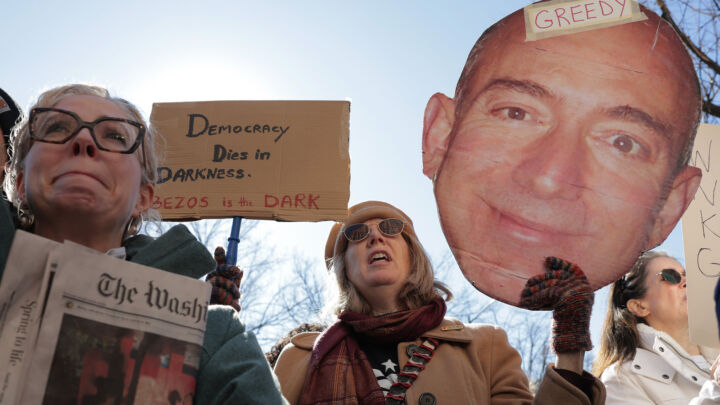Zohran Mamdani’s rise is fuelled by generational resentment
Downwardly mobile Millennials, not blue-collar workers, are driving the new ‘socialism’.

Want unlimited, ad-free access? Become a spiked supporter.
The likely election of Zohran Mamdani as New York City’s next mayor reflects a profound shift in generational politics. As the era of boomer domination finally draws to a close, a new cohort is bringing fresh energy to an already polarised landscape on both right and left – with potentially devastating results.
Diminishing economic prospects for younger workers have played a key role in undermining faith in free-market capitalism, making the case for socialism seem viable again. Cast largely in traditional Marxist terms, many on the reinvigorated left see the ‘cost of living’ focus as a promising strategy for progressives otherwise out of step on cultural issues.
Yet it would be wrong to view Mamdani’s rise as driven primarily by the working class. In the primary, he lost in many predominantly black and Latino areas such as the Bronx, Brownsville and Rosedale, and traditional working-class districts like Canarsie in south Brooklyn, all of which backed his rival, Andrew Cuomo. Mamdani’s support instead came largely from the gentrified zones of Lower Manhattan and brownstone Brooklyn, particularly Williamsburg, where a cadre of educated young voters drove record turnouts. A recent New York Times poll shows Mamdani with 73 per cent of the vote among 19- to 29-year-olds, compared with just 32 per cent among voters over 65. Only a massive mobilisation of older New Yorkers, who generally favour Cuomo, threatens his momentum.
Whether he wins or not, Mamdani epitomises a youthful politics defined by the primacy of social media. His followers tend to be less conventionally literate and more prone to political extremes. Their politics – epitomised by the media-savvy Mamdani – is largely performative, based more on emotion than on even remotely practical policy. His candidacy is merely the latest cause célèbre, following a sequence of ‘progressive’ enthusiasms from climate change to transgender rights to the Palestinian cause.
Some young activists also display a disturbing acceptance of political violence. A YouGov poll in September 2025 found that among adults under 30, 19 per cent said political violence could sometimes be justified, compared with 11 per cent of Americans overall. In one survey, nearly 38 per cent of respondents – and more than half of progressives – said the assassination of Donald Trump would be ‘justified’.
In this new political configuration, gender now plays a central role. The existence of a gender gap in politics is nothing new, but, according to recent Gallup surveys, it is now five times larger than in 2000. Indeed, it is especially pronounced among Generation Z where Trump’s approval rate among young men hovers near 45 per cent, compared with just 24 per cent among women.
The left is increasingly dominated by women. Among Americans aged 18 to 29, 52 per cent of women identify as Democrats, compared with 35 per cent of men, while 38 per cent of young men lean Republican – nearly twice the share of young women. A similar divergence has appeared abroad. In South Korea’s 2022 presidential race, 59 per cent of men aged 18 to 29 voted conservative, while women overwhelmingly backed the ‘progressive’ candidate. Across Europe, 21 per cent of young men support right-wing and populist parties compared with 14 per cent of young women.
Sexual preference has also become a key marker of political orientation. Mamdani – despite his Islamist ties – has performed strongly in heavily gay areas of Manhattan, Brooklyn and Queens. The female-dominated left often has gay leaders. According to Gallup, Gen Z women identify as LGBTQ at more than twice the rate of millennials and nearly three times that of young men.
For many in this generation, even the concept of dating and mating is fading. Roughly 31 per cent of American men aged 18 to 24 reported no sexual activity in the past year, up from 19 per cent two decades earlier. Many seem destined never to marry or have children. The share of US adults aged 25 to 54 without partners has risen from 29 per cent in 1990 to 38 per cent in 2019.
This new generational politics reflects the personal realities of what the Financial Times describes as a more neurotic, lonely generation, less likely to embrace family life. That suggests a troubling future: marriage remains a key determinant of success, correlating with higher incomes, lower child poverty and greater life satisfaction. As Richard Reeves has observed, ‘You don’t upend a 12,000-year-old social order without experiencing cultural side effects’.
Young men, too, suffer from the decline of family and the ongoing ‘sex recession’. Some of their bitterness is visible among the so-called incels – men without meaningful contact with women – who have been linked to misogyny and, at the extremes, political violence. Yet far more of them simply yearn for traditional structures.
NBC polling found that young male Trump voters ranked having children as the top marker of success; female Harris voters ranked it near the bottom. Marriage revealed a similar split: 29 per cent of men said it defined success, compared with just six per cent of women. Meanwhile, 39 per cent of women cited emotional stability as essential to a successful life, versus nine per cent of men.
Straight young men are clearly feeling alienated. On American campuses they are castigated as toxic and aggressive; in literary circles, straight white male writers are now shunned.
It is hardly surprising that young men seek to preserve what remains of their cultural roles. As Frank Furedi notes in his forthcoming In Defence of Populism, many have been left behind by post-industrial economies with few well-paid jobs for non-graduates. Confronted by a feminist and post-familial progressive culture, young men are turning to the right. In Germany, men under 30 back the AfD at roughly twice the rate of women; in America, young men increasingly support Trump.
This cascade of generational angst can only be eased by restoring the prospect of upward mobility. The ratio of men aged 25 to 55 not in the labour force is three times what it was 20 years ago. Across Europe, up to one fifth of under-30s are neither in school nor in work. In Britain, parents now worry about ‘generation jobless’.
Home ownership – once the lodestone of middle-class life and a precondition for family formation – is increasingly out of reach. In the US, housing affordability stands at the lowest level ever recorded, with one in three Americans spending more than 30 per cent of their income on rent or mortgage payments. Home ownership among under-35s has fallen steadily and is now half the rate of those over 45.
Much the same is true elsewhere. In Ireland, only a third of millennials own a home, compared with almost two-thirds of baby boomers at the same age. In Britain, at least one-third of millennials are likely to remain permanent renters. In Australia, home ownership among those aged 25 to 34 has dropped from over 60 per cent in 1981 to just 45 per cent in 2016.
Millennials and Gen Z are understandably angry about their dimming prospects even as many in the older generations hoard the spoils. Boomers hold half of the $32 trillion in US home equity. In Britain, one in four boomers is a millionaire, mostly thanks to inflated property prices. Retirees now enjoy higher incomes than working-age Britons, according to the Resolution Foundation.
At the same time, younger people face declining real earnings and an ever-tougher job market, even for graduates – a situation worsened by artificial intelligence. Big Tech figures such as Reid Hoffman promise that AI will ‘elevate humanity’, but McKinsey estimates it could force at least 12million Americans to find new work by 2030. Some 82 per cent of millennials fear that AI will reduce their pay – and they are right to worry. Barely half of under-30s currently have full-time jobs. Even the ‘geeks’ may soon learn that they, too, are vulnerable to ‘skills-based technological change’.
Unless new hope emerges, society will grow ever more divided. Mamdani’s ‘cost of living’ campaign – calling for rent control, free buses, childcare and city-owned supermarkets – could offer a road back to power for the left. A majority of people under 40 now express support for this form of socialism, as do most college students. Even more striking, one survey found that a majority favour income caps, with many suggesting a limit above $1million.
The emergence of a permanent class of renters provides fertile ground for class warfare and for policies such as rent control, eviction protection and housing subsidies. Without strong families, individuals increasingly look to the state for support and even for meaning.
These generational forces have lifted an obscure leftist like Zohran Mamdani to the verge of becoming mayor of America’s largest and most important city. Angry and disappointed young people have always posed a threat to established orders – from Tsarist Russia and imperial China to Weimar Germany and modern Latin America. Unless society expands opportunity for the young and reacquaints them with the principles of liberal democracy, the future is likely to follow the patterns already visible in the present. And that is not good news at all.
Joel Kotkin is a spiked columnist, a presidential fellow in Urban Studies at Chapman University in Orange, California, and a senior research fellow at the University of Texas’ Civitas Institute.
£1 a month for 3 months
You’ve hit your monthly free article limit.
Support spiked and get unlimited access.
Support spiked – £1 a month for 3 months
spiked is funded by readers like you. Only 0.1% of regular readers currently support us. If just 1% did, we could grow our team and step up the fight for free speech and democracy.
Become a spiked supporter and enjoy unlimited, ad-free access, bonus content and exclusive events – while helping to keep independent journalism alive.
———————————————————————————————————————————–
Exclusive January offer: join today for £1 a month for 3 months. Then £5 a month, cancel anytime.
———————————————————————————————————————————–
Monthly support makes the biggest difference. Thank you.










Comments
Want to join the conversation?
Only spiked supporters and patrons, who donate regularly to us, can comment on our articles.